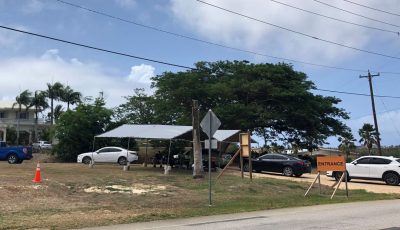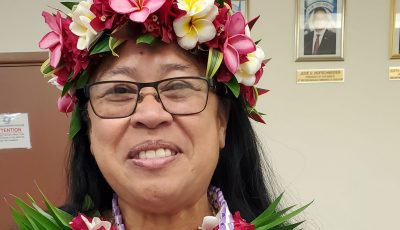Frica: Co-op plagued by non-cooperative farmers
Ironically, the CNMI Farmers Cooperative Association—which was formed to coordinate and strengthen the island’s agricultural sector—is plagued by members who refuse to cooperate for the continued and improved operation of the market in Garapan, according to former co-op president and manager Maria Frica Pangelinan.
In a report submitted to the co-op board and membership along with her resignation, Pangelinan said the market’s first year of operation was doomed by the lack of cooperation among members.
“This past year has clearly highlighted most of the farmers’ lack of understanding and cooperation in actions required to support meeting our mutually beneficial economic goals,” she said.
Except for a loyal few, Pangelinan said many farmers are “not fully cooperating in the spirit of cooperative principles and legal foundations.”
Moreover, farmers also prefer to sell their products directly to others.
“Most farmers prefer to sell their products directly to government agencies, businesses, and individuals. Although as members of the co-op, it doesn’t make sense why they would demise themselves by undermining their own co-op,” Pangelinan said.
Some members of the co-op also ignore their membership and continue to support the Sabalu Market—a competitor group—or want to set up their own tents outside the co-op market building, according to Pangelinan.
Those who set up their tents every Saturday do so with the condition that the co-op pays them for what they are not able to sell directly, she said.
“In other words, the co-op will be the dumping place for Saturday tent leftovers,” she said.
Pangelinan also noted the old problem of farmers not having a regular production and supply of produce to sell.
She said farmers need to be classified based on their labor input and the level of revenue they generate.
“A category of farmers should be described as to who are full-time commercial, part-time commercial, full-time subsistence, part-time subsistence. Once these farmers are classified, only then does the infrastructure for market expansion become a real issue. Government agencies such as [the Northern Marianas College-Cooperative Research, Extension and Education Service] and [Department of Lands and Natural Resources] would also have a better organization as to which farmers should receive government services and support to reach the market,” Pangelinan said.
The co-op also needs someone who will be able to prove to the farmers the value of being a member, she said.
The former senator presented four options for the Garapan market: maintain the status quo, go out of business, retrench, or expand.
Under retrenching, Pangelinan suggested that the co-op temporarily close the operation inside the building, while farmers have the option to continue selling their produce outside the building, using their own expenses and absorbing their own losses. This way, completion of the energy grant will proceed and the new manager of the co-op can plan the next step for the organization.
Under expansion, Pangelinan suggested the inclusion of other locally made products to be sold in the market.
“There is a need to include all locally made foods and products to be part of the co-op. The name can be ‘Produktun Taotao Tano’ or ‘Ko’operatibun Taotao Tano.’ This will include all cottage-type industries, processed food, fiesta food, local recipes food, and anything locally made using local natural resources of the island,” Pangelinan said.
The addition of imported products could also be done to supplement local produce during low peak or when crops are affected by weather, she said.
In conclusion, Pangelinan recommends retrenchment.
“Retrenchment would provide the best hope and opportunity for the co-op’s future success,” she said.
Pangelinan resigned as co-op president on Oct. 28, 2015.



























